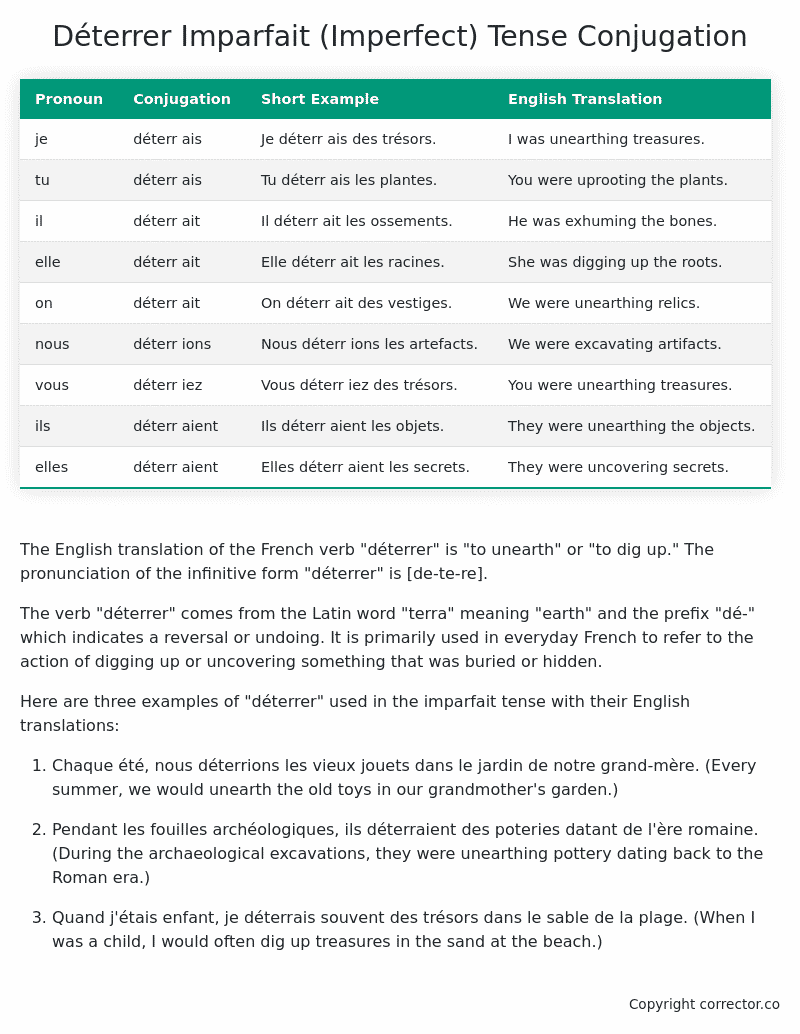Imparfait (Imperfect) Tense Conjugation of the French Verb déterrer
Introduction to the verb déterrer
The English translation of the French verb “déterrer” is “to unearth” or “to dig up.” The pronunciation of the infinitive form “déterrer” is [de-te-re].
The verb “déterrer” comes from the Latin word “terra” meaning “earth” and the prefix “dé-” which indicates a reversal or undoing. It is primarily used in everyday French to refer to the action of digging up or uncovering something that was buried or hidden.
Here are three examples of “déterrer” used in the imparfait tense with their English translations:
-
Chaque été, nous déterrions les vieux jouets dans le jardin de notre grand-mère.
(Every summer, we would unearth the old toys in our grandmother’s garden.) -
Pendant les fouilles archéologiques, ils déterraient des poteries datant de l’ère romaine.
(During the archaeological excavations, they were unearthing pottery dating back to the Roman era.) -
Quand j’étais enfant, je déterrais souvent des trésors dans le sable de la plage.
(When I was a child, I would often dig up treasures in the sand at the beach.)
Table of the Imparfait (Imperfect) Tense Conjugation of déterrer
| Pronoun | Conjugation | Short Example | English Translation |
|---|---|---|---|
| je | déterr ais | Je déterr ais des trésors. | I was unearthing treasures. |
| tu | déterr ais | Tu déterr ais les plantes. | You were uprooting the plants. |
| il | déterr ait | Il déterr ait les ossements. | He was exhuming the bones. |
| elle | déterr ait | Elle déterr ait les racines. | She was digging up the roots. |
| on | déterr ait | On déterr ait des vestiges. | We were unearthing relics. |
| nous | déterr ions | Nous déterr ions les artefacts. | We were excavating artifacts. |
| vous | déterr iez | Vous déterr iez des trésors. | You were unearthing treasures. |
| ils | déterr aient | Ils déterr aient les objets. | They were unearthing the objects. |
| elles | déterr aient | Elles déterr aient les secrets. | They were uncovering secrets. |
Other Conjugations for Déterrer.
Le Present (Present Tense) Conjugation of the French Verb déterrer
Imparfait (Imperfect) Tense Conjugation of the French Verb déterrer (You’re reading it right now!)
Passé Simple (Simple Past) Tense Conjugation of the French Verb déterrer
Passé Composé (Present Perfect) Tense Conjugation of the French Verb déterrer
Futur Simple (Simple Future) Tense Conjugation of the French Verb déterrer
Futur Proche (Near Future) Tense Conjugation of the French Verb déterrer
Plus-que-parfait (Pluperfect) Tense Conjugation of the French Verb déterrer
Passé Antérieur (Past Anterior) Tense Conjugation of the French Verb déterrer
Futur Antérieur (Future Anterior) Tense Conjugation of the French Verb déterrer
Subjonctif Présent (Subjunctive Present) Tense Conjugation of the French Verb déterrer
Subjonctif Passé (Subjunctive Past) Tense Conjugation of the French Verb déterrer
Subjonctif Imparfait (Subjunctive Imperfect) Tense Conjugation of the French Verb déterrer
Subjonctif Plus-que-parfait (Subjunctive Pluperfect) Tense Conjugation of the French Verb déterrer
Conditionnel Présent (Conditional Present) Tense Conjugation of the French Verb déterrer
Conditionnel Passé (Conditional Past) Tense Conjugation of the French Verb déterrer
Conditionnel Passé II (Conditional Past II) Tense Conjugation of the French Verb déterrer
L’impératif Présent (Imperative Present) Tense Conjugation of the French Verb déterrer
L’impératif Passé (Imperative Past) Tense Conjugation of the French Verb déterrer
L’infinitif Présent (Infinitive Present) Tense Conjugation of the French Verb déterrer
L’infinitif Passé (Infinitive Past) Tense Conjugation of the French Verb déterrer
Le Participe Présent (Present Participle) Tense Conjugation of the French Verb déterrer
Le Participe Passé (Past Participle) Tense Conjugation of the French Verb déterrer
Struggling with French verbs or the language in general? Why not use our free French Grammar Checker – no registration required!
Get a FREE Download Study Sheet of this Conjugation 🔥
Simply right click the image below, click “save image” and get your free reference for the déterrer imparfait tense conjugation!

Déterrer – About the French Imparfait Tense
NOTE: To take a deep dive into all the French tenses then see our article on Mastering French Tense Conjugation.
Formation of the Imparfait Tense
For regular -er verbs:
For regular -ir verbs
For regular -re verbs
Common Everyday Usage Patterns
Description of Past Habits
Background Information
Mental and Emotional States
It’s employed to express emotions, thoughts, or physical sensations in the past. For example: “J’étais content quand il est arrivé.” (I was happy when he arrived.)
Ongoing Actions
Points to Note About the Imparfait Tense
Passé Composé vs. Imparfait
Conditional
Si Clauses
Narration
I hope you enjoyed this article on the verb déterrer. Still in a learning mood? Check out another TOTALLY random French verb imparfait conjugation!


